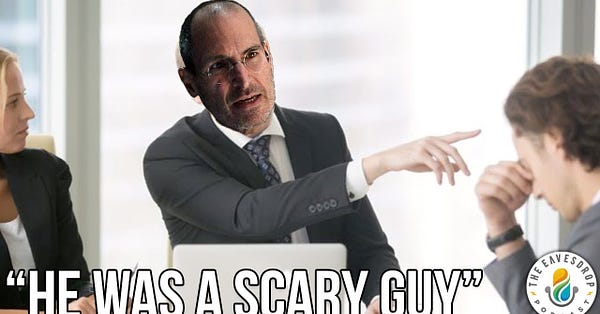Venture Capital Is Hard
Today: VC not that diffracted in Europe; excess capital; diversification; Brian Armstrong’s memo.

The Agenda 👇
Europe should lead on revenue-based & indie financing
Venture capital is hard from every perspective
Rise of the passive investors in VC
US companies have a US problem
An interview with Emma’s cofounders
All about The Family in one video (🇫🇷)

🇪🇺 Diffracted Venture Capital, But Not in Europe
Everyone who’s interested in how startups are funded knows about the trend that I call the Diffraction of Venture Capital: there used to be a time when VC was a simple and straightforward game, consisting in deploying equity across several rounds, with the expectation of very high returns. But now the picture has gotten blurrier: venture capital is undergoing diffraction.
Part of that diffraction is the rise of new financial instruments targeted at startups with specific needs: SaaS companies that get ever better at predicting future revenue, thus they can raise debt rather than equity; and ‘indie’ founders that don’t necessarily want to make it that big and are looking for capital that’s less dilutive and less demanding of those high returns.
It turns out that both of these segments are well represented in Europe. Because ours is a fragmented continent, founders are easily attracted to either SaaS or ‘indie’ startups. However, most of the innovation to better fund such startups is happening elsewhere—specifically, in the US. How can we reverse that trend? Check out my latest in Sifted:
Whereas there’s a vibrant conversation and visible initiatives around those issues in the US, Europe still generally endorses the idea that ‘tech’ is a homogeneous category and that every tech startup has the same funding needs. We are stuck with the assumption that anything that looks and sounds like it’s a tech startup should be financed by venture capital, with the related dilution and expectations from a returns perspective.
👉 Read: Europe should lead the way on alternatives to traditional VC 👀
😓 Nobody Said It Was Easy
Open any financial newspaper these days, and you’re certain to encounter one of those articles discussing negative interest rates, a world awash with too much money, investors in desperate search of where to deploy capital in order to generate returns. Yet if you’re a founder trying to raise another round, it feels like it’s harder than ever. I explain why here: Why Is It Still So Hard to Raise in a Time of Cheap Capital?
A friend reacted by pointing out that this idea of a “global savings glut” (which I discovered in 2015 reading Fidelity’s investment research), is now subject to serious reconsideration, with the “radical increase in US inequality, substantially driven by a generation of wage repression” emerging as the main culprit for the global mismatch on capital markets: “Savings Glut” Fables and International Trade Theory: An Autopsy.
By the way, it’s not only founders that have a hard time raising capital. The VCs that are supposed to fund them are suffering, too, because we’re all confronted with the worrying scarcity of exits in European tech. The conversation has been quite vibrant recently on Twitter, and it inspired me to write an essay on why it will get worse before it gets better: You're Gonna Need Bigger Exits 🦈
🤑 Diversification vs. Concentration in VC
Another problem that looms over the VC world is the difficulty in making the case that it comes with predictable returns. There have been many discussions over the recent period about seeking exposure to larger, more diverse portfolios so as to tighten the dispersion of returns across venture capital as an asset class. Others make the case that VC delivers results only if you make concentrated bets.
Part of the Diffraction of Venture Capital is turning the business into more an industry than a craft, with exposure to a larger portfolio and an approach that emulates passive investing (indexing) rather than picking only a few companies and hoping for the best. On one side are the proud craftsmen, the Benchmark and Point Nine of this world; on the other are the likes of 500 Startups, AngelList, and YC.
It’s really too early to draw conclusions, but last week I wrote down a first iteration, VCs: Would You Rather Be Yahoo or Google? Then I sent it to a selection of very smart people I know in the industry to collect their feedback. So far, that’s been that diversification is seductive in theory, difficult to implement in practice, but software eating the world could turn it into a major trend.
🇺🇸 Not That Easy to Do Business in the US
Finally, last week a big part of tech Twitter was busy commenting on Brian Armstrong’s memo about the fact that Coinbase, as a mission-focused company, won’t make room anymore for political activism from its employees. Most people disagreed, some agreed. It created the perfect controversy, out of which everyone, starting with Armstrong, got what they expected.
It turns out it resonates a lot with my idea of the corporation being an unstable contract tying up three parties: shareholders, employees, and customers. The main challenge for any corporate executive is to help those conflicting parties find the right balance of power so as to maximize the economic surplus created by the company. It’s a good perspective for understanding what capitalism is about!
In the case of US tech companies, the case is mostly settled: customers tend to be the stronger party at the table (case in point: Amazon). Considering this, I’m not surprised that some companies such as Coinbase have issues with their employees gaining more leverage and thus destabilizing the contract’s balance. In short: I’m sympathetic with Armstrong; but also, this is all so typically American…
There’s another perspective beyond strategy, that of culture. To be frank, this whole controversy is so typically American—not only is it not being covered that much on this side of the Atlantic, it’s rather difficult to understand if you don’t realize two things that are very specific to the US: America’s is a low-context culture, and America’s is a weak government.
Read my essay 👉 The Corporate Contract (Coinbase Edition).
On that note—subscribe to European Straits and let me know what you think!

🏦 If you’re going to build a super app in personal finance, you need to have those all-important viral effects. The team at Emma, one of our portfolio companies, are masters at finding new ways to have their users bring in an ever-wider group of people looking for a healthier way to manage their finances (as they put it, they’re your “financial therapist”). Our friends at the VC firm Connect Ventures have a nice interview with CEO Edoardo Moreni here.
🦁 One of the first products that we developed at The Family was Koudetat, a kind of Netflix for entrepreneurs. For the past two years, it’s been given a fresh look, voice and spirit, led by Valentin Richard, who’s now off to keep pushing ever further on the goal of creating the new generation of education. Valentin signed off with this video about The Family and his experiences with us (in French 🇫🇷 but you can switch the language for the subtitles):
😮 Finally, this tweet made the rounds. I highly recommend watching the video (via Trevor McKendrick)!



From The Diffraction of Venture Capital (June 2019):
Traditional VC (Carlota Perez’s “financial capital”) was fine for funding the installation of the Entrepreneurial Age. But now that rudimentary form of financial capital is in the process of expanding, diversifying, and specializing, which gives birth to a whole new financial services industry whose goal is to serve an ever increasing number of tech companies across various geographies and industries. This marks the rise of Carlota’s “production capital”—and this is causing the current diffraction.
All recent editions:
The Corporate Contract (Coinbase Edition)—for subscribers only.
VCs: Would You Rather Be Yahoo or Google?—for subscribers only.
You're Gonna Need Bigger Exits—for subscribers only.
Why Is It Still So Hard to Raise in a Time of Cheap Capital?—for subscribers only.
Where Does VR Fit in the Transition?—for everyone.
Chaosix, VR, and the Hardware Lottery—for subscribers only.
The State of Corporate Venture Capital—for subscribers only.
Tales of a Fragmenting World—for subscribers only.
A Memo About My Firm, The Family—for subscribers only.
The China Model With Western Characteristics—for everyone.
European Straits is now a 5-email-a-week product, and from now on all essays are subscriber-only (with rare exceptions). Join us!
From Normandy, France 🇫🇷
Nicolas



